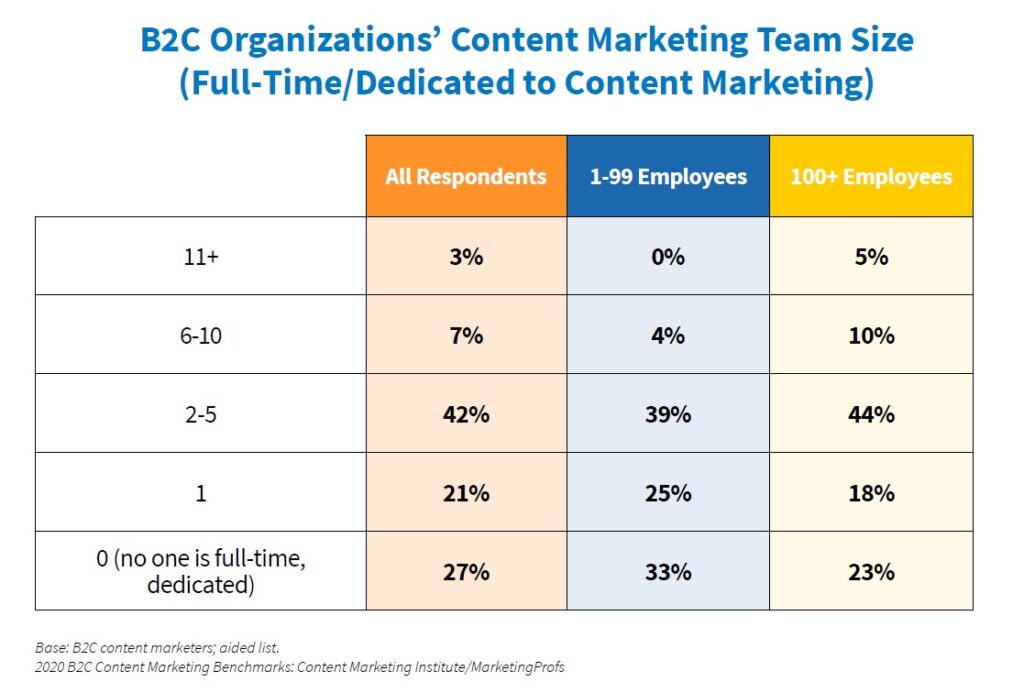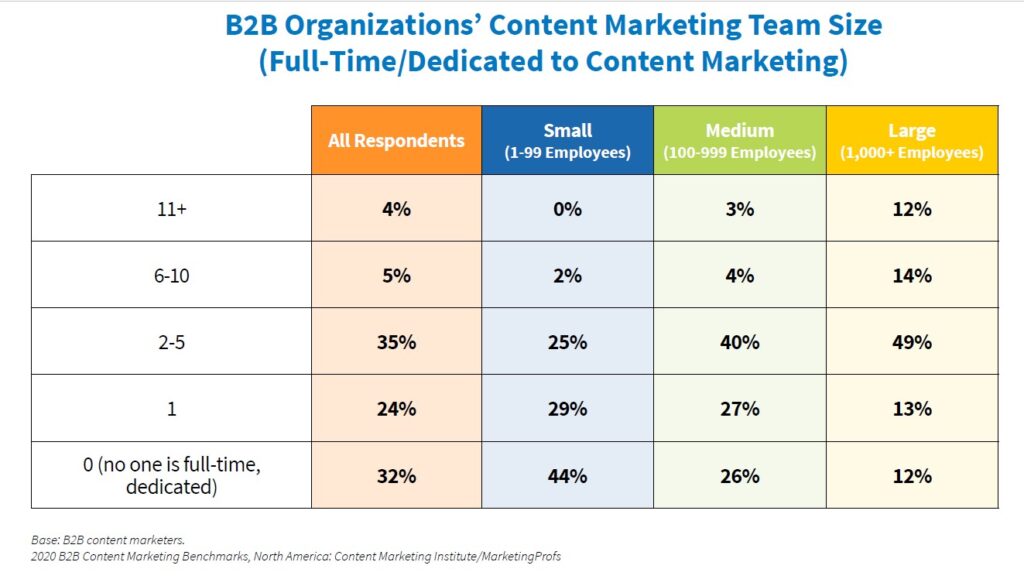How to Build a Content Marketing Team
Content Marketing Team: a team of marketing professionals who work together to plan, research, create, edit, design, distribute, promote. and monitor the performance of your marketing content. Your content marketing team may consist of a content manager, writers, editors, designers, publishers, and promoters.
Topics Covered in This Article
How to Build a Content Marketing Team
Knowing How to Build a Content Marketing Team is essential to the success of your Content Marketing Strategy. Even the best strategy is only as good as the people implementing it.
You have two options for getting this done. First, you can hire a content marketing agency. We discuss this option in our article on the Benefits of a Content Marketing Strategy. The other option is to build your own in-house content marketing team using the advice in this article.

We’ll start with an overview of your content marketing team members, followed by a detailed description of each role and how they work with one another. We’ll also discuss how these team members will work together to implement your Content Distribution Strategy and Content Creation Plan.
By the time you’re done with this article, you’ll understand how to build a content marketing team and whether you should hire a content marketing agency or handle this task in-house.
Your Content Marketing Team Members
Company size is a good metric for determining the size of your content marketing team. According to 2020 research from CMI, the average content marketing team size for B2B organizations B2C organizations is between two and five people.
However, the same research also showed that about a quarter of companies had either no full-time content marketing team or only one person dedicated to the task.
This tells me that these companies either didn’t have much need for content marketing or were outsourcing it.
Organizations with larger content marketing teams (with six to ten members) represent less than ten percent of smaller organizations. In my experience, these are the ideal sizes for a content marketing team, as summarized below.
Lean Content Marketing Team – 4 to 5 Members
Full Content Marketing Team – 7 to 10 Members
The rest of this article will explain these members, their roles, and how they might work with each other to implement your content marketing strategy. I’ll also explain which personality types and personality traits I’ve found to be best suited for each of these roles, and why. Here’s a summary of the personality trait model and personality type models we’ll be referencing in this article.
The Big Five Personality Traits
Personality Trait #1: Openness
Openness (aka, “openness to experience) is a personality trait characterized by receptivity to new experiences and ideas. People high in trait openness are curious. They like being surprised, and are more likely to seek out novel experiences.
Like the other Big Five Personality Traits, openness exists on a spectrum—meaning that some people are higher in trait openness than others. People high in openness are more likely to be adventurous, curious, and inventive while those low in openness are more likely to be cautious, closed-minded, and consistent.
In the workplace, those high in openness are natural innovators and quicker to adapt to change while those low in openness will be more meticulous and consistent.
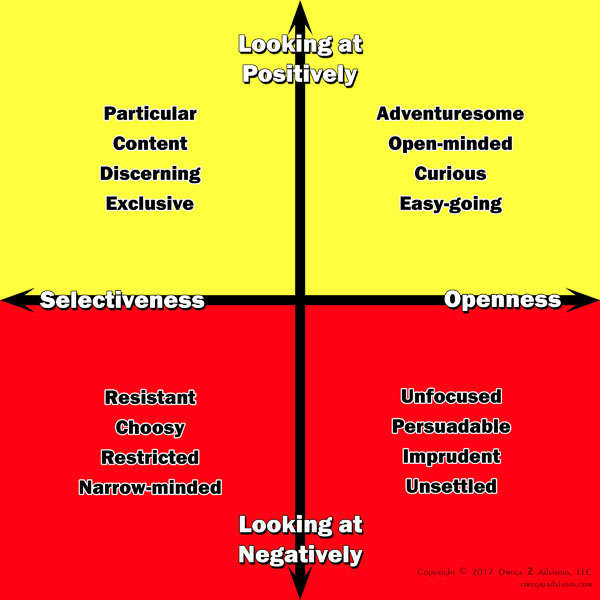
Source: Omega Z Advisors Article on Openness.
*You are reading the VQ Success article on How to Build a Content Marketing Team.
Personality Trait #2: Conscientiousness
Conscientiousness is a personality trait characterized by industriousness, self-control, responsibility, and reliability. People high in trait conscientiousness are organized, ambitious, self-disciplined, and goal-oriented.
Like the other Big Five Personality Traits, conscientiousness exists on a spectrum—meaning that some people are higher in trait conscientiousness than others. People high in conscientiousness are more likely to be hard-working and to adhere to norms and rules while those low in conscientiousness are more likely to be carefree and easy-going.
In the workplace, those high in conscientiousness are efficient, diligent, and organized while those low in conscientiousness will be more relaxed and flexible.
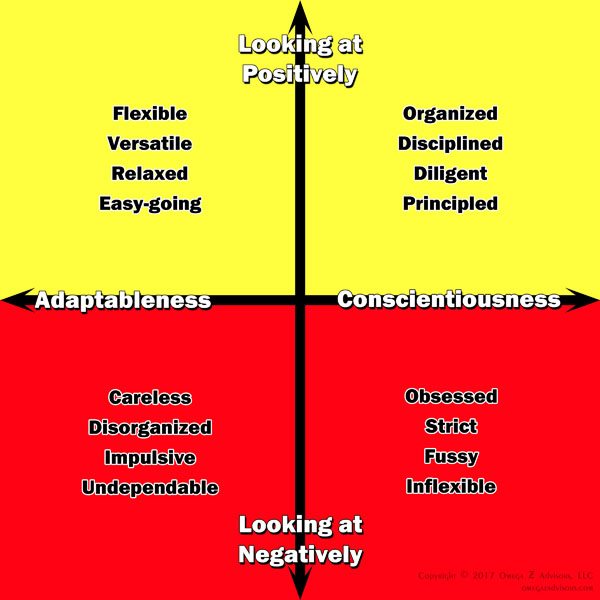
Source: Omega Z Advisors Article on Conscientiousness.
*You are reading the VQ Success article on How to Build a Content Marketing Team.
Personality Trait #3: Extroversion
Extroversion is a personality trait characterized by talkativeness, enthusiasm, and social confidence. People high in trait extroversion are outgoing, expressive, and sociable.
Like the other Big Five Personality Traits, extroversion exists on a spectrum—meaning that some people are more extroverted than others. People high in trait extroversion are more likely to be sociable and are energized by interactions with others while those low in (introverts) are more likely to be thoughtful and are energized by time alone.
In the workplace, those high in extroversion are persuasive and quick to take charge of social situations while introverts will be more mindful and understanding.
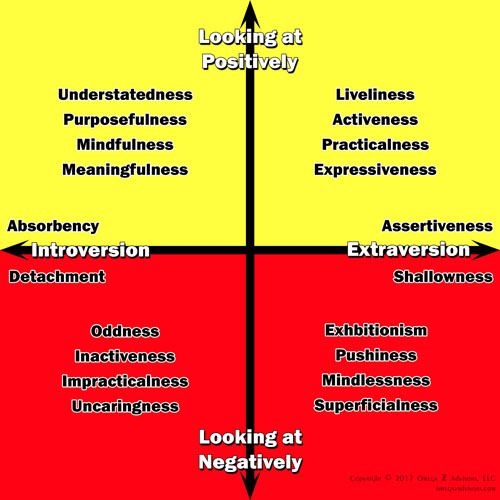
Source: Omega Z Advisors Article on Extroversion.
*You are reading the VQ Success article on How to Build a Content Marketing Team.
Personality Trait #4: Agreeableness
Agreeableness is a personality trait characterized by friendliness, loyalty, and empathy. People high in trait agreeableness are polite, trusting, and accepting.
Like the other Big Five Personality Traits, agreeableness exists on a spectrum—meaning that some people are more agreeable than others. People high in trait agreeableness are more likely to be cooperative and conforming while those low in agreeableness are more likely to be controversial and unconventional.
In the workplace, those high in agreeableness are diplomatic and good team players while those low in agreeableness will be more competitive and independent.
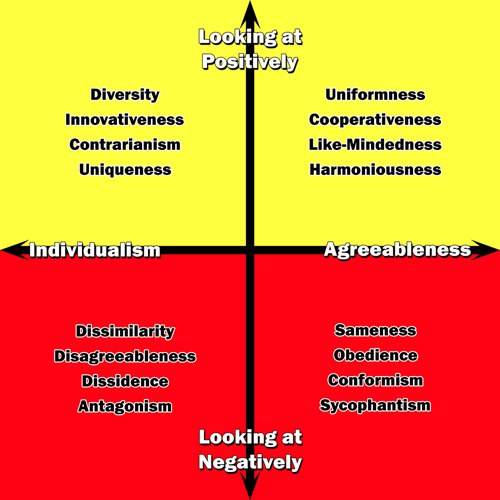
Source: Omega Z Advisors Article on Agreeableness.
*You are reading the VQ Success article on How to Build a Content Marketing Team.
Personality Trait #5: Neuroticism
Neuroticism is a personality trait characterized by sensitivity, excitability, and emotionality. People high in trait neuroticism are anxious, intense, and pessimistic.
Like the other Big Five Personality Traits, neuroticism exists on a spectrum—meaning that some people are more neurotic than others. People high in trait neuroticism are more likely to be moody and emotional while those low in neuroticism are more likely to be calm and collected.
In the workplace, those high in neuroticism are distracted and inconsistent while those low in neuroticism will be more steady and reasonable.

Source: Omega Z Advisors Article on Neuroticism.
*You are reading the VQ Success article on How to Build a Content Marketing Team.
The Four Primary Personality Types
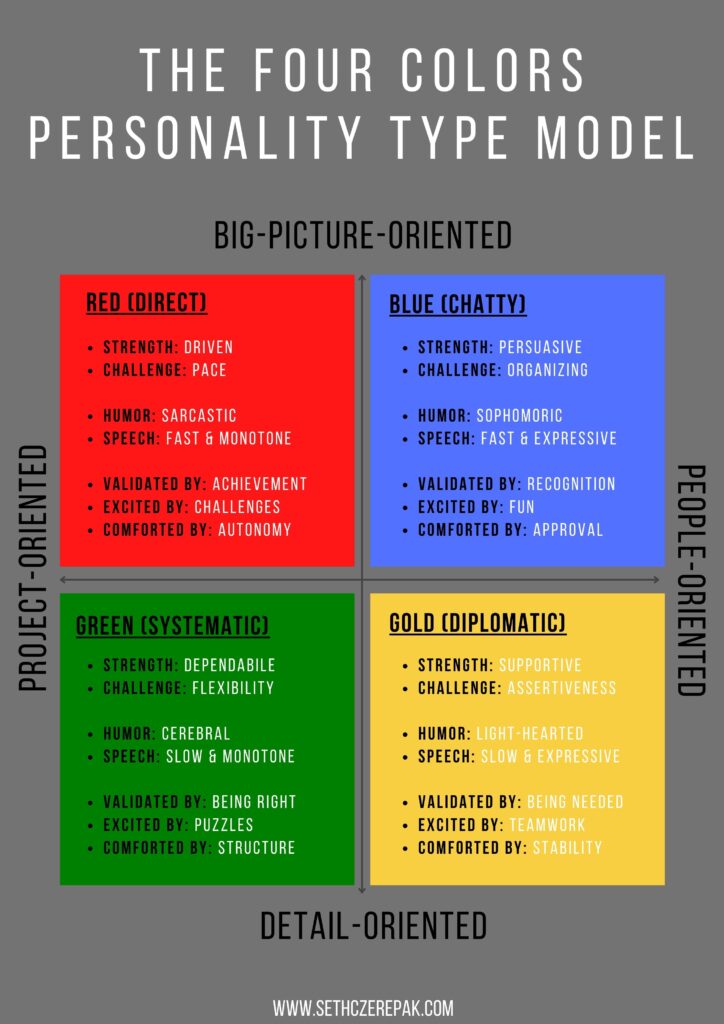
Red (Dominant)
In The Antifragile Sales System, we describe this personality type using the following ten traits:
NOTE: The DISC model calls this the “Dominant” personality type.
*You are reading the VQ Success article on How to Build a Content Marketing Team.
Gold (Supportive)
In The Antifragile Sales System, we describe this personality type using the following ten traits:
NOTE: The DISC model calls this the “Supportive” personality type.
*You are reading the VQ Success article on How to Build a Content Marketing Team.
Green (Compliant)
In The Antifragile Sales System, we describe this personality type using the following ten traits:
NOTE: The DISC model calls this the “Compliant” personality type.
*You are reading the VQ Success article on How to Build a Content Marketing Team.
Blue (Influential)
In The Antifragile Sales System, we describe this personality type using the following ten traits:
NOTE: The DISC model calls this the “Influential” personality type.
*You are reading the VQ Success article on How to Build a Content Marketing Team.
Content Marketing Team Member #1: Content Manager
This section describes the skills, responsibilities, and the ideal personality types and traits of a Chief Content Officer (COO) and a Content Team Manager. Smaller content marketing teams (ten members or less) can usually be managed by a Content Team Manager, while larger teams (or departments) may require both a Content Team Manager and a Chief Content Officer.
Chief Content Officer (CCO)
Your Chief Content Officer oversees every step of your Content Marketing Strategy, from setting your Content Marketing Goals to tracking your Content Marketing ROI. They work closely with your Content Marketing Manager to make sure every effort is supporting the larger vision of your content marketing strategy. Your CCO will also play a key role in planning and overseeing your Cost-Benefit Analysis.
Chief Content Officer Skills
Ideally, you don’t want your CCO doing any of the work that your writers, editors, designers, or publishers are responsible for. But they should be familiar enough with these responsibilities to effectively communicate with everyone on your content marketing team.
Chief Content Officer Responsibilities
(If your team doesn’t have a CCO, your Content Marketing Manager will fulfill these responsibilities)
Chief Content Officer Personality
The ideal personality type for a COO is the “Red” (Dominant) personality because they’re big-picture focused and highly motivated by setting and achieving big ambitious goals. Ideally, your CCO should have the following score ranges on the Big Five Personality Traits:

Openness supports the visionary aspect of this role while conscientiousness ensures that your CCO will be disciplined, ambitious, and goal-oriented. Extroversion is of medium importance for leadership and persuasiveness, but your CCO will also need to be task-oriented and able to work alone when needed.
Agreeableness is less important since your CCO will need to be unwavering in their commitment to goals and processes while low neuroticism ensures that they will remain steady and poised under pressure.
Content Marketing Manager
Your Content Marketing Manager works with the members of your content marketing team to ensure that every step of your Content Creation Plan and Content Distribution Strategy are properly executed. They also work closely with your Chief Content Officer to make sure every effort is supporting the larger vision of your content marketing strategy.
Content Marketing Manager Skills
Content Marketing Manager Responsibilities
Content Marketing Manager Personality
The ideal personality type for a Content Marketing Manager is the “Gold” (Supportive) personality because they’re people-oriented and attentive to detail. Ideally, your Content Marketing Manager should have the following score ranges on the Big Five Personality Traits:

Openness supports the coaching aspect of this role. Moderate conscientiousness ensures that your Content Marketing Manager will be disciplined enough to get projects completed, but flexible enough to work with all your team members. Extroversion is of medium importance for leadership and communication, but your Content Marketing Manager will also need to have the listening skills and empathy of an introvert.
Medium agreeableness is important since Content Marketing Managers need to inspire team cooperation while low neuroticism ensures that they will be calm and collected under pressure.
Content Marketing Team Member #2: Content Writer
Your Content Writer is almost 100% responsible for executing Step #2 of your Content Creation Plan. They will also work with your Content Editor and Salesperson to process editing suggestions for clarity and style.
Content Writers can also help your other team members generate unique ideas for making your marketing content more interesting and memorable.
Beyond that, it is important not to treat your content writer like a jack of all trades or to distract them with excessive emails, meetings, or non-writing duties.

Writing is hard work and demands a tremendous amount of mental focus and creativity. Writers do their best work when they can commit most, or all, of their time to writing. The more non-writing responsibilities you pile on them, the less physical, mental, and creative energy they’ll have for creating remarkable content. This is also why your content writer should be safe from distractions and have plenty of uninterrupted time to work.
Content Writer Skills
Content Writer Responsibilities
Content Writer Personality
The ideal personality type for a Content Writer is the “Red” (Dominant) personality because they’re task-oriented, self-motivated, and work well under pressure. Ideally, your Content Writer should have the following score ranges on the Big Five Personality Traits:

Medium openness supports the creative aspect of this role while conscientiousness ensures that your Content Writer will be diligent, industrious, and deadline-driven. Low extroversion (introversion) is important for this role since your Content Writer will need to be able to work for long time periods without distraction.
Medium agreeableness combined with low neuroticism ensures that your Content Writer will be calm and receptive to constructive feedback and editing suggestions from your Content Editor and Salesperson.
Content Marketing Team Member #3: Content Editor
Your Content Editor should be obsessed with details, accuracy, and credibility. If your Content Manager, Content Writer, and Salesperson are doing their jobs, you’ll be producing and publishing a massive amount of content.
Your Content Editor will be the quality-assurance expert who makes sure your content is clear, credible, and error-free. They should also be able to uncover the fine details that will make your content uniquely credible.

Content Editor Skills
Content Editor Responsibilities
Content Editor Personality
The ideal personality type for a Content Editor is the “Green” (Compliant) personality, because they’re precise, task-oriented, and have excellent attention to detail. Ideally, your Content Editor should have the following score ranges on the Big Five Personality Traits:

Low openness combined with high conscientiousness ensures that your Content Editor will have high standards for clarity and correctness. Low extroversion (introversion) is important for this role since your Content Editor will need to be thoughtful, observant, and able to work alone at times.
Medium agreeableness combined with low neuroticism ensures that your Content Editor will be levelheaded and objective when giving constructive feedback and editing suggestions to your Content Writer.
Content Marketing Team Member #4: Salesperson
Your Salesperson should literally be a salesperson at your company. This is because their primary job will be to ensure that your content is relevant to the conversations happening between your prospects and your sales staff, and between our customers and your customer service staff.
This is not something you should guess about. I’ve been consulted to write sales copy for many small businesses during my career.

Far too many business owners assume that they’re the only person I should consult on getting the message right. My response is to insist on also talking to the person who takes incoming calls from prospective clients. I do this because this person has the most practical insights about which words, phrases, and other linguistic nuances will need to go into the message. This is how you make your content relevant and authentic to your Buyer Persona.
This is also how you make sure that your content addresses the most common objections and misconceptions made by your prospects. Your Salesperson’s job is to make sure these crucial details become a part of your Buyer’s Journey strategy. This is especially important for your Stage #3 and Stage #4 content. No one can provide these insights as well as someone who doubles as an active Salesperson at your company.
Salesperson Skills
Salesperson Responsibilities
Salesperson Personality
The ideal personality type for your Salesperson is the “Blue” (Influential) personality, because they’re people-oriented, persuasive, and have keen social intuitions. Ideally, your Salesperson should have the following score ranges on the Big Five Personality Traits:
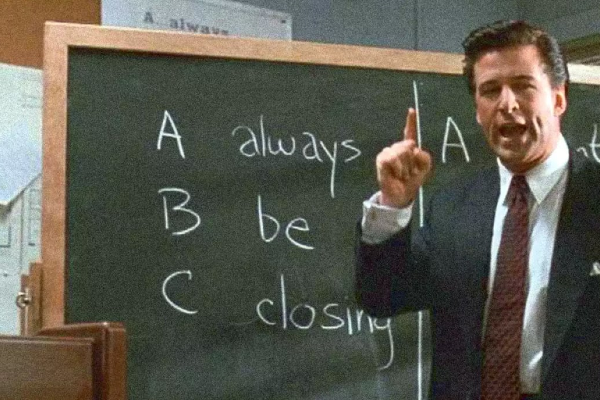
Openness is generally an important trait for salespeople while medium conscientiousness ensures that your Salesperson will be adequately ambitious, and goal-oriented. High extroversion ensures that your Salesperson will bring enthusiasm and persuasiveness to your content creation and polishing process.
Medium agreeableness combined with low neuroticism ensures that your Salesperson will be levelheaded and objective when giving constructive feedback and editing suggestions to your Content Writer.
Content Marketing Team Member #5: Content Designer
Your Content Designer makes your content look good. This could mean designing your company newsletter using Adobe InDesign, publishing an SEO article on your WordPress website, or creating an audio-visual presentation using Adobe Spark.
Your Content Designer should have the technical skills and artistic flair to make your content look amazing while keeping it aesthetically consistent with your brand image.

Depending on the size and scope of your Content Distribution Strategy, you might need multiple Content Designers for each of your media formats. For example, you might have a designer who specializes in video production and editing and another who specializes in print design, and a third who specializes in website design and creating social media posts.
Content Designer Skills
Content Designer Responsibilities
Content Designer Personality
The ideal personality type for a Content Designer is the “Gold” (Supportive) personality, because they usually have a good blend of creative prowess and attention to detail. Ideally, your Content Designer should have the following score ranges on the Big Five Personality Traits:

Openness supports the creative aspect of this role while conscientiousness ensures that your Content Designer will be diligent, industrious, and deadline-driven. Low extroversion (introversion) is important for this role since your Content Designer will often need to work alone and without distractions.
Medium agreeableness combined with low neuroticism ensures that your Content Designer will be open and receptive to constructive feedback from other team members, like your Content Editor and Salesperson.
Content Marketing Team Member #6: Content Publisher
Your Content Publisher is the last person in our the content distribution pipeline. They take the finished content files from your Content Designer and publish (or schedule) them on your content distribution channels.
More importantly, you Content Publisher works to get your content recognized by submitting it to search engines, promoting it on social media, interacting with those who comment on it, and pitching it to potential third-party publishers and distributors.

Content Publisher Skills
Content Publisher Responsibilities
Content Publisher Personality
The ideal personality type for a Content Publisher is the “Blue” (Influential) personality, because they’re people-oriented, persuasive, and have keen social intuitions. Ideally, your Content Publisher should have the following score ranges on the Big Five Personality Traits:

Openness is important for the promotional aspect of this role while medium conscientiousness ensures that your Content Publisher will be adequately ambitious, and goal-oriented. High extroversion ensures that your Content Publisher will bring enthusiasm and persuasiveness to your content distribution and promotion process.
Medium agreeableness combined with low neuroticism ensures that your Content Publisher will be friendly and sociable when interacting with people who comment on your content and with third-party publishers and distributors.
Content Marketing Team Member #8: Content Analyst
Your Content Analyst tracks and analyzes your Content Marketing KPIs and creates (or advises on) strategies for improving them. They will create and manage split testing experiments to optimize your content headlines, openings, calls to action, messaging and design themes, and other details.
Your Content Analyst works with your Content Marketing Manager(s) to improve your Content Marketing ROI and most importantly, to track the progress of your primary content marketing objective, which is to build Content Equity.
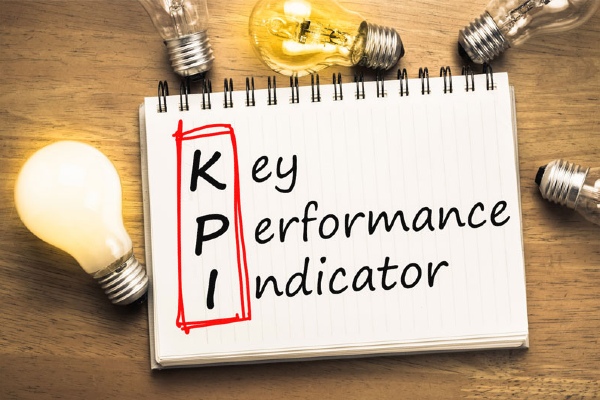
Content Analyst Skills
Content Analyst Responsibilities
Content Analyst Personality
The ideal personality type for a Content Analyst is the “Green” (Compliant) personality, because they’re precise, task-oriented, and have excellent attention to detail. Ideally, your Content Analyst should have the following score ranges on the Big Five Personality Traits:

Medium openness ensures that your Content Analyst don’t be too rigid with your other team members, while high conscientiousness ensures that they will have high standards for clarity and precision. Low extroversion (introversion) is important for this role since your Content Analyst will need to be thoughtful, observant, and able to work alone.
Low agreeableness combined with low neuroticism ensures that your Content Analyst will be thorough and objective when analyzing statistical data and using it to gauge content performance.
Final Thoughts on How to Build a Content Marketing Team
We hope you enjoyed this article on How to Build a Content Marketing Team.
Remember that even the best Content Marketing Strategy is only as good as the people implementing it. You have two options for building a dream that can make your strategy a success.
One option is to build your own in-house content marketing team using the insights in this article. Your other option is to hire a B2C or B2B Content Marketing Agency. This is where we can help.
VQ Success is a B2B Content Marketing Agency that specializes in content-rich website articles and email campaigns to attract more leads and convert them into loyal customers. Our signature Content Marketing Strategy combines these eight best practices of digital B2B content marketing:

Like anything else worth doing, a successful content marketing strategy demands hard work, patience, sacrifice, and critical thinking. This is why smart companies invest five or six figures a year into hiring content marketing agencies or building in-house content marketing departments. If you’re ready to attract more leads, win more customers, and grow your business, contact us now for a consultation.
This concludes our article on How to Build a Content Marketing Team.
-Best
